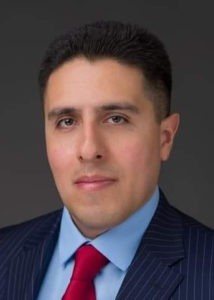June 15 marks the 10-year anniversary of the Deferred Action for Childhood Arrivals program, but no one seems to be celebrating.
Conservative leaders bent on ending immigration across the board yearn for the demise of DACA, a 2012 creation of then-President Barack Obama to grant immigrants brought illegally into the U.S. as children temporary status to live and work without fear of deportation.
And DACA recipients, known as Dreamers, along with many of the advocates who support them, are encountering the milestone with mixed emotions given the program’s serious legal challenges and the fact that new applications cannot be accepted until pending cases are resolved.
One Dreamer described feelings of gratitude mixed with dread as DACA’s decade mark neared.

Ricardo Morones Torres
“It’s an anniversary of me gaining some sense of freedom and acceptance here in the United States. It means the opportunity to stay here and achieve or work toward my dreams. Because of DACA, I can work legally. I can have a house and pay my mortgage and property taxes in the U.S.,” said Ricardo Morones Torres, an Austin, Texas, resident enrolled in the program since 2013.
But knowing thousands of others cannot apply evokes memories of his own struggles before DACA and triggers worries about the uncertain future of all Dreamers, he said. “I think ‘mourning’ is an appropriate word. I feel terrible for the people who can’t apply because I know how it feels to live in the shadows and not be able to apply for certain jobs.”
A significant challenge to DACA arose during the Trump administration, which tried to end the program but was blocked by the U.S. Supreme Court in 2020.
The biggest worry for Dreamers currently centers on the U.S. Southern District Court in Houston, where Judge Andrew Hanen in July 2021 declared DACA to be illegal and barred new applicants to the program. The White House has appealed the ruling, and oral arguments are scheduled to be heard in July.
“That’s a significant concern,” Torres said of the federal case in Texas. “I am concerned about the legal challenges that are coming. I fear I am going to end up without status and losing my job and my house.”
According to the National Immigration Forum, as many as 3.6 million Dreamers reside in the United States, with only 653,000 enrolled in DACA.
Faith-based and secular immigration advocates are using the June 15 anniversary to reenergize their pleas for Congress to provide permanent residency to Dreamers.
Faith-based and secular immigration advocates are using the June 15 anniversary to reenergize their pleas for Congress to provide permanent residency to Dreamers.
“Over the past decade, DACA has allowed hundreds of thousands of young people — including many who are integral members of evangelical churches, campuses and organizations — the opportunity to pursue their dreams, support their families and serve their communities,” the Evangelical Immigration Round Table said in a June 12 letter to members of the U.S. House and Senate.
The organization of church, denominational, parachurch, ministry and Christian college leaders urged bipartisan solutions that respect the God-given dignity of each individual, guarantee secure borders and provide pathways to legal status or citizenship for qualified immigrants, including DACA recipients.
The group added that “we are writing to implore you to act now to ensure that Dreamers who arrived in the U.S. as children have the opportunity to pursue permanent legal status and eventual citizenship, to be recognized formally as belonging within the United States of America, the country in which most of them have lived the majority of their lives, and the only country which some of them can even remember.”
The letter included a reminder of recent polling data showing 82% of evangelical voters support citizenship for Dreamers. It also contained a biblical reference to prod federal lawmakers.
“The Scriptures implore us: ‘Do not withhold good to those to whom it is due, when it is in your power to act.’ (Proverbs 3:27-28). As members of Congress, it is in your power — and your power alone — to finally resolve the plight of Dreamers, and you must not defer action further on this responsibility when you have the authority to resolve the issue this year.”
Supporting Dreamers not only is the compassionate thing to do but the smart thing to do for the nation, according to members of the Council on National Security and Immigration.
“Immigrants, including Dreamers, are essential contributors to our communities, our economy and our military.”
“Immigrants, including Dreamers, are essential contributors to our communities, our economy and our military. Dreamers have demonstrated themselves as true Americans, and their contributions bolster U.S. national security. A permanent solution for Dreamers would allow them to contribute even more by allowing many more of them to serve in the military and other national security spaces,” former Department of Homeland Security official Dan Brown said in a news release from the council.
And then there is the economic argument for Dreamers, said Adam Estle, vice president of field and constituencies for the National Immigration Forum.
“Deferred Action for Childhood Arrivals has been an undisputed success for American employers and communities, but with an asterisk: Its future has never been certain,” he said. “We hear the call from every corner of the country: Republicans and Democrats should work together on immigration reforms that create an opportunity for Dreamers to earn legal status and citizenship, alongside stronger border security and solutions for America’s farmers and ranchers.”
Related articles:
Huge hurdles ahead for Dreamers despite high court’s DACA ruling


